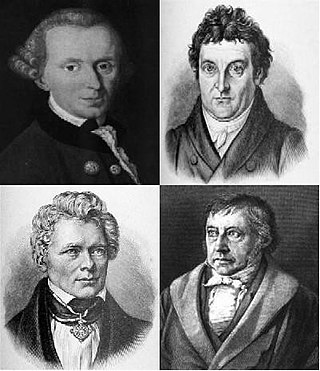
Metaphilosophy, sometimes called the philosophy of philosophy, is "the investigation of the nature of philosophy". Its subject matter includes the aims of philosophy, the boundaries of philosophy, and its methods. Thus, while philosophy characteristically inquires into the nature of being, the reality of objects, the possibility of knowledge, the nature of truth, and so on, metaphilosophy is the self-reflective inquiry into the nature, aims, and methods of the activity that makes these kinds of inquiries, by asking what is philosophy itself, what sorts of questions it should ask, how it might pose and answer them, and what it can achieve in doing so. It is considered by some to be a subject prior and preparatory to philosophy, while others see it as inherently a part of philosophy, or automatically a part of philosophy while others adopt some combination of these views.

Skepticism, also spelled scepticism, is a questioning attitude or doubt toward knowledge claims that are seen as mere belief or dogma. For example, if a person is skeptical about claims made by their government about an ongoing war then the person doubts that these claims are accurate. In such cases, skeptics normally recommend not disbelief but suspension of belief, i.e. maintaining a neutral attitude that neither affirms nor denies the claim. This attitude is often motivated by the impression that the available evidence is insufficient to support the claim. Formally, skepticism is a topic of interest in philosophy, particularly epistemology. More informally, skepticism as an expression of questioning or doubt can be applied to any topic, such as politics, religion, or pseudoscience. It is often applied within restricted domains, such as morality, atheism, or the supernatural. Some theorists distinguish "good" or moderate skepticism, which seeks strong evidence before accepting a position, from "bad" or radical skepticism, which wants to suspend judgment indefinitely.

Analytic philosophy is a branch and tradition of philosophy using analysis, popular in the Western world and particularly the Anglosphere, which began around the turn of the 20th century in the contemporary era in the United Kingdom, United States, Canada, Australia, New Zealand, and Scandinavia, and continues today. Analytic philosophy is often contrasted with continental philosophy, coined as a catch-all term for other methods prominent in Europe.

Afrocentrism is an approach to the study of world history that focuses on the history of people of recent African descent. It is in some respects a response to Eurocentric attitudes about African people and their historical contributions. It seeks to counter what it sees as mistakes and ideas perpetuated by the racist philosophical underpinnings of Western academic disciplines as they developed during and since Europe's Early Renaissance as justifying rationales for the enslavement of other peoples, in order to enable more accurate accounts of not only African but all people's contributions to world history. Afrocentricity deals primarily with self-determination and African agency and is a pan-African point of view for the study of culture, philosophy, and history.

German idealism was a philosophical movement that emerged in Germany in the late 18th and early 19th centuries. It developed out of the work of Immanuel Kant in the 1780s and 1790s, and was closely linked both with Romanticism and the revolutionary politics of the Enlightenment. The best-known thinkers in the movement, besides Kant, were Johann Gottlieb Fichte, Friedrich Wilhelm Joseph Schelling, Georg Wilhelm Friedrich Hegel, and the proponents of Jena Romanticism. August Ludwig Hülsen, Friedrich Heinrich Jacobi, Gottlob Ernst Schulze, Karl Leonhard Reinhold, Salomon Maimon and Friedrich Schleiermacher also made major contributions.

Ubuntu is a Nguni Bantu term meaning "humanity". It is sometimes translated as "I am because we are", or "humanity towards others". In Xhosa, the latter term is used, but is often meant in a more philosophical sense to mean "the belief in a universal bond of sharing that connects all humanity".

Continental philosophy is a term used to describe some philosophers and philosophical traditions that do not fall under the umbrella of analytic philosophy. However, there is no academic consensus on the definition of continental philosophy. Prior to the twentieth century, the term "continental" was used broadly to refer to philosophy from continental Europe. A different use of the term originated among English-speaking philosophers in the second half of the 20th century, who used it to refer to a range of thinkers and traditions outside the analytic movement. Continental philosophy includes German idealism, phenomenology, existentialism, hermeneutics, structuralism, post-structuralism, deconstruction, French feminism, psychoanalytic theory, and the critical theory of the Frankfurt School as well as branches of Freudian, Hegelian and Western Marxist views.
Subjectivity in a philosophical context has to do with a lack of objective reality. Subjectivity has been given various and ambiguous definitions by differing sources as it is not often the focal point of philosophical discourse. However, it is related to ideas of consciousness, agency, personhood, philosophy of mind, reality, and truth. Three common definitions include that subjectivity is the quality or condition of:

In its most common sense, methodology is the study of research methods. However, the term can also refer to the methods themselves or to the philosophical discussion of associated background assumptions. A method is a structured procedure for bringing about a certain goal. In the context of research, this goal is usually to discover new knowledge or to verify pre-existing knowledge claims. This normally involves various steps, like choosing a sample, collecting data from this sample, and interpreting this data. The study of methods involves a detailed description and analysis of these processes. It includes evaluative aspects by comparing different methods to assess their advantages and disadvantages relative to different research goals and situations. This way, a methodology can help make the research process efficient and reliable by guiding researchers on which method to employ at each step. These descriptions and evaluations of methods often depend on philosophical background assumptions. The assumptions are about issues like how the studied phenomena are to be conceptualized, what constitutes evidence for or against them, and what the general goal of research is. When understood in the widest sense, methodology also includes the discussion of these more abstract issues.

Contemporary philosophy is the present period in the history of Western philosophy beginning at the early 20th century with the increasing professionalization of the discipline and the rise of analytic and continental philosophy.
African philosophy is the philosophical discourse produced in Africa or by indigenous Africans. The term Africana philosophy refers to the philosophy of African descendants outside Africa, including African Americans. African philosophers are found in the various academic fields of present philosophy, such as metaphysics, epistemology, moral philosophy, and political philosophy. One particular subject that several modern African philosophers have written about is that on the subject of freedom and what it means to be free or to experience wholeness. Philosophy in Africa has a rich and varied history, some of which has been lost over time. Some of the world's oldest philosophical texts have been produced in Ancient Egypt (Kemet), written in Hieratic and on papyrus, from ca. 2200 to 1000 BCE, one of the earliest known African philosophers was Ptahhotep, an ancient Egyptian philosopher. In general, the ancient Greeks acknowledged the Egyptian forebearers, and in the fifth century BCE, the philosopher Isocrates declared that earliest Greek thinkers traveled to Egypt to seek knowledge; one of them Pythagoras of Samos who “was first to bring to the Greeks all philosophy.” In the 21st century, new research by Egyptologists has indicated that the word "philosopher" itself seems to stem from Egypt: "the founding Greek word philosophos, lover of wisdom, is itself a borrowing from and translation of the Egyptian concept mer-rekh (mr-rḫ) which literally means “lover of wisdom,” or knowledge." In the early and mid-twentieth century, anti-colonial movements had a tremendous effect on the development of a distinct modern African political philosophy that had resonance on both the continent and in the African diaspora. One well-known example of the economic philosophical works emerging from this period was the African socialist philosophy of Ujamaa propounded in Tanzania and other parts of Southeast Africa. These African political and economic philosophical developments also had a notable impact on the anti-colonial movements of many non-African peoples around the world.

Philosophy and economics studies topics such as public economics, behavioural economics, rationality, justice, history of economic thought, rational choice, the appraisal of economic outcomes, institutions and processes, the status of highly idealized economic models, the ontology of economic phenomena and the possibilities of acquiring knowledge of them.
Henry Odera Oruka was a Kenyan philosopher who is best known for "Sage Philosophy". It was a project started in the 1970s in an attempt to preserve the knowledge of the indigenous thinkers in traditional African communities.
In parapsychology, an apparitional experience is an anomalous experience characterized by the apparent perception of either a living being or an inanimate object without there being any material stimulus for such a perception.

Philosophy is the systematized study of general and fundamental questions, such as those about existence, reason, knowledge, values, mind, and language. Some sources claim the term was coined by Pythagoras, although this theory is disputed by some. Philosophical methods include questioning, critical discussion, rational argument, and systematic presentation.
The Fortune of War was an ancient public house in Smithfield, London. It was located on a corner originally known as 'Pie Corner', today at the junction of Giltspur Street and Cock Lane where the Golden Boy of Pye Corner resides, the name deriving from the magpie represented on the sign of an adjoining tavern. It is allegedly the place where the Great Fire of London stopped, after destroying a large part of the City of London in 1666. The statue of a cherub, the Golden Boy of Pye Corner, initially built in the front of the pub, commemorates the end of the fire.
Egbesu is the god or deity of justice of the Ijaw people of the Niger Delta region. Egbesu is also perceived as the spiritual foundational force for combating evil. The Egbesu force can only be used in defence or to correct an injustice, and only by people who are in harmony with the universe. The symbol of the divine force is the leopard, panther, and lion. Egbesu has both a philosophical and spiritual dimension, the latter of which has been more prominent during recent times due to conflicts in regions where the Ijaw reside.
Africana philosophy is the work of philosophers of African descent and others whose work deals with the subject matter of the African diaspora. The name does not refer to a particular philosophy, philosophical system, method, or tradition. Rather, Africana philosophy is a third-order, metaphilosophical, umbrella-concept used to bring organizing oversight to various efforts of philosophizing. Africana philosophy is a part of and developed within the field of Africana studies.

Do Animals Have Rights? is a 2005 non-fiction book on animal rights by British philosopher Alison Hills from the University of Bristol. The book explores the ethics of factory farming, animal experimentation and other issues involving animals from a philosophical analysis.

Cynthia R. Nielsen is an American philosopher and Professor of Philosophy at the University of Dallas. She is known for her expertise in the field of hermeneutics, the philosophy of music, aesthetics, ethics, and social philosophy. Since 2015 she has taught at the University of Dallas. Prior to her appointment at the University of Dallas, she taught at Villanova University as a Catherine of Sienna Fellow in the Ethics Program. Nielsen serves on the executive committee of the North American Society for Philosophical Hermeneutics.








